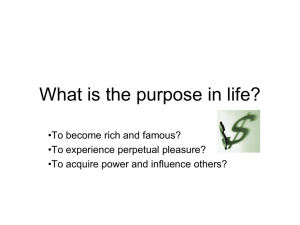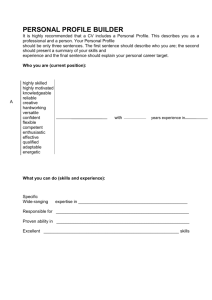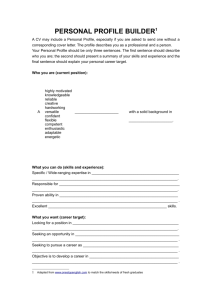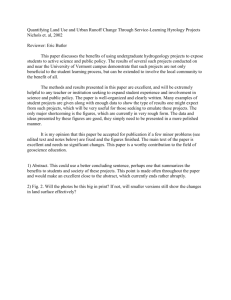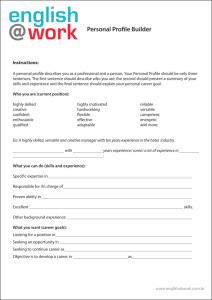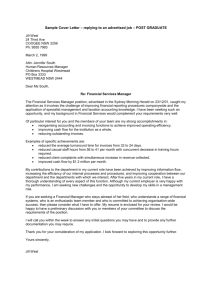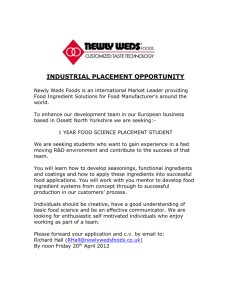Lecture slides - UNC School of Information and Library Science
advertisement
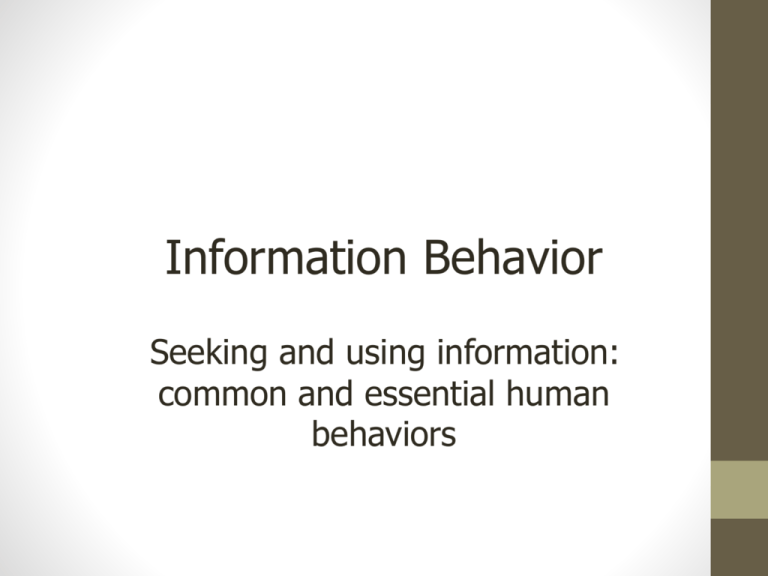
Information Behavior Seeking and using information: common and essential human behaviors Types of Information Behaviors • • • • • Encountering – stumbling upon a bus stop sign Needing – when does the next bus arrive? Finding – looking at a time table Choosing – which time table? Using Information – boarding the correct bus These behaviors are basic to human existence. Definitions • information – any difference you perceive, • in your environment or within yourself. It is any aspect that you notice in the pattern of reality. information need – a recognition that your knowledge is inadequate to satisfy a goal that you have. David O. Case (2007) Definitions Cont. • information seeking – conscious effort to acquire information in response to a need or gap in your knowledge. David O. Case (2007) Definition of Information Behavior • information behavior (IB) – encompasses information seeking as well as the totality of other unintentional or passive behaviors (such as glimpsing or encountering information), as well as purposive behaviors that do not involve seeking, such as actively avoiding information. History of Systematic Research On Information Seeking • dates back nearly a century • concerned mainly with libraries and the mass media • By the 1960’s reports of specialized information needs and uses of scientists and engineers were appearing regularly in numerous journals and reports. History of Systematic Research On Information Seeking Cont. • focused on artifacts and venues of information seeking • The information sources were studied and how they were used, rather than individual users and their needs History of Systematic Research On Information Seeking Cont. • What mattered before was how formal information systems served the information needs of the population studied • system oriented, not user oriented History of Systematic Research On Information Seeking Cont. • in the 1970’s investigations began to branch out beyond the focus on formal systems and task-oriented needs • shifted away from the traditional thought of information as a system and towards the person as a finder, creator, and user of information Why do we study information behavior? • All people seek information. For some people and in some situations the stakes are much higher • Higher stakes are more likely to create situations that attract research. • There is a broad array of goals and motives in studying information research. Why do we study information behavior? • Example: market research, an entire industry that investigates purchase decisions (seeking and using info on what to purchase); individual purchases are relatively small yet they all add up to significant amounts of money garnered or lost in the long run Aspects Studied of Information Behavior (The Context) Context includes • motives for seeking info • specific activities and kinds of information • surrounding environment • types of people • size of social group involved in investigations The Definition of Context • context – the particular combination of person and situation that served to frame an investigation • the interrelated conditions in which something exists or occurs: environment, setting (http://www.merriam-webster.com) The Definition of Context 9) Time and space - individual situations can be ignored in addressing information seeking and use. But the individual's assessment of his or her situation shapes his or her needs as much as the "real" situation itself! Brenda Dervin (1976) Chapter 2: Common Examples of Information Behavior “People are not accustomed to thinking hard and are often content to trust a plausible judgment that comes quickly to mind.” Daniel Kahneman. (2003). American Economic Review 93 (5), p. 1450 • Searching for information is an important part of being human, it is something we do on a regular basis • Every day of our lives we engage in some activity that might be called information seeking. Five Common Situations • That underscore the complexity of information seeking and the strategies we use to make it simpler. • All of the situations involved not only the search for information but the choice of which data to retain and consider. Buying Products • Goal is to reduce the often massive amount of salient information into a few key factors, rated or described in the simplest way possible. Better for manufacturers if the user to see advertisement and buy then search for information. Three Common Anomalies • Mysterious influence called taste • Personal contacts have strong influence, whether they compel agreement… • Affluence and education Library Observations • Most users of the library do not search in-depth. • Most user are reluctant to ask a librarian or search the catalog for help. The scenario about the patient in the hospital showcases the importance seeking information in groups. The team members of the physician, nurse, night nurse, and pharmacist work together in measuring, searching, and recording information. Each measurement most be taken carefully and be as accurate as possible because it is important and useful related to the life of the patient. What is another example of situation where information is processed in this way? Collaborative information seeking/use Herbert Simon - satisficing Simon argued that the presumed goal of maximization (or optimization) is virtually always unrealizable in real life, owing both to the complexity of the human environment and the limitations of human information processing. Herbert Simon - satisficing In choice situations, people actually have the goal of “satisficing” rather than maximizing. To satisfice, people need only to be able to place goods on some scale in terms of the degree of satisfaction they will afford, and to have a threshold of acceptability. To satisfice is to pursue not the best option, but a good enough option. Simon, H. A. (1957). Models of man, social and rational: Mathematical essays on rational human behavior. New York: Wiley. Quality Information • What does that mean to you? • • • • • • • Accuracy Depth Caliber of sources Timeliness Documentation Verified by several sources Interest / new / fresh Seeker(s) and situation Main motivation Sources of information Time pressure Degree of thoroughness Julie: car purchase Optimize functionality and value Friends, web pages, salespeople Low (months) low Leslie: library research Class assignment; earn credit/grade Online catalogs, books, journals, professional advice (on how to search Moderate (weeks) moderate Hospital ICU team members: caring for an accident victim Work assignment; desire to help others Observation of patient, paper and electronic records, monitoring devices, medical manuals, hospital employees Very high (hours or days, based on patient improvement High Joe: horse race wager Desire for thrill; to win money Special journals, observation, intuition Very high (minutes) high George: legal research Work assignment; help relatives Special databases and publications, professional advice High (days) high Maria: information on cancers Curiosity; preemptive information search Web pages, books, brochures, friends, experts None (lifetime) moderate What factors might determine an individual's point of satisficing? Or in other words if two people have the same information goal, time pressure, etc., what might make one person feel satisfied sooner/later than the other person? Summary • Few problems are immediately solved by the • • • • discovery of relevant information. People resort to simple strategies Too much information isn’t necessary a good thing Satisfying: a type of behavior, take into consideration time and place, good enough to satisfy the need of the seeker Optimizing: Seeker of information did not make every possible attempt to the most complete, accurate, and detailed information available The scenario about the patient in the hospital showcases the importance seeking information in groups. The team members of the physician, nurse, night nurse, and pharmacist work together in measuring, searching, and recording information. Each measurement most be taken carefully and be as accurate as possible because it is important and useful related to the life of the patient. What is another example of situation where information is processed in this way? -Ally Collaborative information seeking/use In small groups, brainstorm and identify a realworld situation that requires some form of collaborative information search. If you are the project manager/coordinator what sort of rules/requirements would you initiate?
